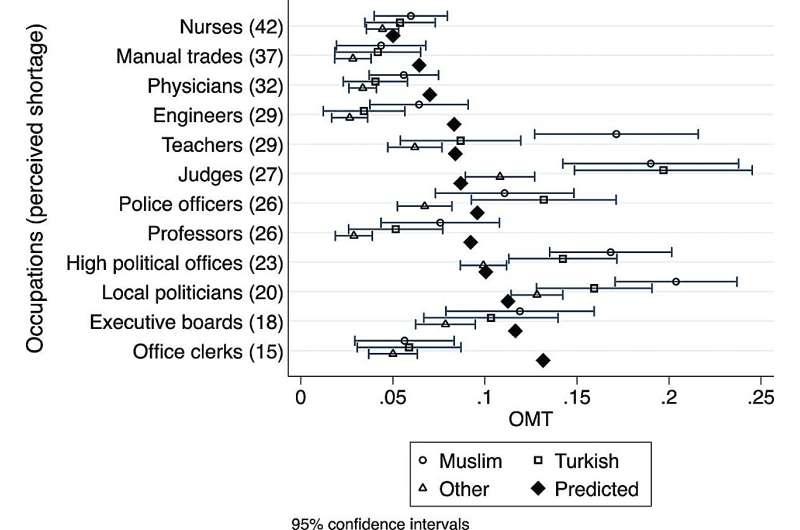This article has been reviewed according to Science X's editorial process and policies. Editors have highlighted the following attributes while ensuring the content's credibility:
fact-checked
proofread
Social acceptance of immigrants working as politicians or judges is low, finds German study

Often, the dominant society develops negative attitudes towards immigrants and their descendants because their integration is too successful—and not because they are unwilling to integrate. This is the finding of a new study conducted by researchers of the University of Mannheim and Humboldt-Universität zu Berlin.
During the last decades, the descendants of immigrants have become increasingly successful in many Western European countries, Germany included. This is shown in many national and international comparative studies. Still, acceptance and recognition on the part of the mainstream have not kept pace.
What are the reasons? Mannheim sociologist Professor Dr. Frank Kalter and Professor Dr. Naika Foroutan from Humboldt-Universität zu Berlin aimed at answering this question. The result of their experimental study: A possible explanation for negative attitudes towards successful immigrants could be the dominant society's fear of immigrants occupying influential and value-based occupations. This applies, for example, to immigrants working in local politics or law.
"We have had great success with integrating immigrants. On the labor market or in the education sector, for example, integration is successful and, measured against the often difficult starting conditions, also rather quick," explains Kalter.
"Nevertheless, this is not how integration is generally perceived. Public opinion fuels the myth that integration has failed, which completely ignores the facts. This discrepancy has caused us to take a closer look at the underlying mechanisms," Kalter continues.
The researchers analyzed twelve different professions and seven groups of immigrants. They differentiated between real and symbolic threats. Real threat means that, in the eyes of the majority society, the provision of material needs such as food or shelter is jeopardized by the rise of minority groups. Symbolic threats refer to the cultural values and norms of a society, such as general rules of behavior that immigrants allegedly undermine—as some people fear.
The result of the study: Muslims of Turkish origin and Syrian refugees, in particular, face greater social rejection in Germany—regardless of how successful they are. In addition, symbolic threats play a greater role in Germany than real ones. This means that when immigrated minorities occupy positions that shape the societal norms and rules of mainstream society, this may be perceived as threatening even if it does not directly jeopardize their own material situation.
The study also demonstrates that the symbolic threats increase, in particular, when Muslim immigrants take these types of jobs.
The study, which is based on data from the National Discrimination and Racism Monitor (NaDiRa) of the German Center for Integration and Migration Research (DeZIM Institute), has been recently published in the Journal of Ethnic and Migration Studies.
More information: Frank Kalter et al, Outgroup mobility threat – how much intergenerational integration is wanted?, Journal of Ethnic and Migration Studies (2023). DOI: 10.1080/1369183X.2023.2263830
Provided by Universität Mannheim


















